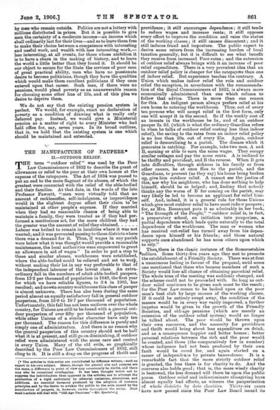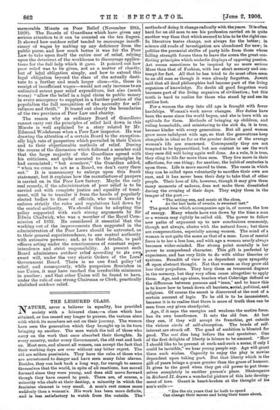THE MANUFACTURE OF PAUPERS.* II.—OUTDOOR RELIEF. T HE term " outdoor
relief " was used by the Poor Law Commissioners of 1832 to describe the grant of allowances or relief to the poor at their own homes at the expense of the ratepayers. The Act of 1834 was passed to put an end to the more flagrant of its abuses, of which the greatest were connected with the relief of the able-bodied and their families. At that date, in the words of the late Professor Fawcett, " men were virtually told that no amount of recklessrffss, self-indulgence, or improvidence would in the slightest degree affect their claim to be maintained at other people's expense. If they married when they bad no reasonable chance of being able to maintain a family, they were treated as if they had per- formed a meritorious act, for the more children they had the greater was the amount of relief they obtained Labour was bribed to remain in localities where it was not wanted; and it was prevented passing to those districts where there was a demand for it. Thus, if wages in any parish were below what it was thought would provide a reasonable maintenance, the local authorities were empowered to grant an allowance in aid of wages." In order to put a stop to these and similar abuses, workhouses were established, where the able-bodied could be relieved and set to work, without making their lot in any way preferable to that of the independent labourer of the lowest class. An extra- ordinary fall in the numbers of adult able-bodied paupers, from 13.2 per thousand of population in 1849, the first year for which we have reliable figures, to 3-4 in 1905, has resulted; and nowiin country workhouses this class of pauper is almost unknown. There has also been during the same period almost an equally satisfactory fall in general outdoor pauperism, from 55.0 to 18.7 per thousand of population. Unfortunately, this fall has not been uniform over the whole country, for Unions are still to be found with a general out- door pauperism of over fifty per thousand of population, while other Unions of a similar character have only ten per thousand. The reason for this difference is purely and simply one of administration. And there is no reason why the general pauperism of this country should not be half what it is at present, and still go on diminishing, if outdoor relief were administered with the same care and control in every Union. Many of the old evils, so graphically described by the Poor Law Commissioners of 1832, still cling to it. It is still a drag on the progress of thrift and
[. The articles in this series are contributed by different writers,—each an expert in his own subject. Hence, though the general aim and purpose are the same, a difference in point of view may occasionally be visible, and there may also be occasional overlapping. It has been thought better not to suppress the individualism thus apparent in the articles, nor to attempt the production of a rigid uniformity by editorial omissions, alterations, and additions. An essential harmony produced by the adoption of common principles, and by the desire to awaken the public to the evils caused by the manufacture of paupers, is, however, visible throughout the series. Next week's article will deal with '• Old-Age Pensions."—Eo. Spectator.]
providence ; it still encourages dependence ; it still tends to reduce wages and increase rents; it still opposes every effort to improve the condition and raise the status of the working classes ; it still causes discontent ; and it still induces fraud and imposture. The public expect to derive some return from the increasing burden of local taxation generally, but it is difficult to see what benefit they receive from increased Poor-rates ; and the extension of outdoor relief always brings with it an increase of poor relief expenditure. There is a very prevalent idea that an outdoor relief policy is cheaper for the ratepayers than one of indoor relief. But experience teaches the contrary. A Union which makes indoor relief the rule and outdoor relief the exception, in accordance with the recommenda- tion of the Royal Commissioners of 1832, is always more economically administered than one which refuses to follow that advice. There is more than one reason for this. An indigent person always prefers relief at his own home to entering the workhouse. Thus, out of every ten persons who will accept relief in the first form, only one will accept it in the second. So if the weekly cost of an inmate in the workhouse be 5s., and of an outdoor pauper 2s. 6d. (which is what the ordinary Guardian refers to when he talks of outdoor relief costing less than indoor relief), the saving to the rates from an indoor relief policy is no less than 20s. out of every 25s. Again, outdoor relief is demoralising to a parish. The disease which it generates is catching. For example, take two men, A and B, earning or able to earn the same wages. They occupy similar cottages and pay the same rents. A is inclined to be thrifty and provident, and B the reverse. When B gets into difficulties, through sickness in his family or from other causes, he at once flies to the parish, and the Guardians, to prevent (as they say) his home being broken up, give him outdoor relief. A cannot see the justice of this, nor why his neighbour, who has done nothing to help himself, should be so helped ; and, finding that nobody thinks any the worse of B for coming on the parish, may very likely be led to become an applicant for relief him- self. And, indeed, it is a general rule for those Unions which give most outdoor relief to have most indoor paupers ; for, as Mrs. Bosanquet puts it so admirably in her book, " The Strength of the People," " outdoor relief is, in fact, a preparatory school, an initiation into pauperism, a partial dependence which leads quite naturally to the total dependence of the workhouse. The man or woman who has received out-relief has turned away from his depen- dence upon himself or his friends ; and those natural supports once abandoned he has none others upon which to rely."
Thenathere is the classic instance of the Somersetshire °colliers. Some thirty-five years ago they met to promote the establishment of a Friendly Society. There was at first a unanimous feeling in favour of the proposal, until some one mentioned that those who became members of such a Society would lose all chance of obtaining parochial relief. The whole tone of the meeting was suddenly changed, and the scheme could not be proceeded with. So long as out- door relief continues to be given such must be the result ; for the Poor Law comes to be looked upon as the poor man's best club by large masses of the working classes. If it could be entirely swept away, the condition of the masses would be in every way vastly improved, a further impetus would be given to the growth of the Friendly Societies, and old-age pensions (which are merely an extension of the outdoor relief system) would no longer be talked about. The poor would be thrown upon their own resources, and the necessity for providence and thrift would bring about less expenditure on drink, and as a consequence happier and better homes ; better personal relations between the rich and the poor would be created, and those (the comparatively few in number) whose indigence had not been produced by their own fault would be cared for, and again started on a career of independenle by private benevolence. It is a remarkable fact that the more strictly outdoor relief is granted, the less there is for charity to do. And the converse also holds good ; that is, the more wisely charity is bestowed, the less demand will there be upon the public purse. Outdoor relief and indiscriminate almsgiving have almost equally bad effects, as witness the pauperisation of whole districts by dole charities. Thirty-six years have now passed since the Poor Law Board issued its memorable Minute on Poor Relief (November 20th, 1869). The Boards of Guardians which have given any serious attention to it can be counted on the ten fingers. It showed how outdoor relief tended to encourage insuffi- ciency of wages by making up any deficiency from the public purse, and how much better it was for the Poor Law to take upon itself the entire cost of relief, relying upon the deterrent of the workhouse to discourage applica- tions for the full help which it gave. It pointed out how poor relief was to be given, not as a matter of charity, but of legal obligation simply, and how to extend this legal obligation beyond the class of the actually desti- tute to a further and much larger class—viz., those in receipt of insufficient wages—would not only increase to an unlimited extent poor relief expenditure, but also (much worse) " allow the belief in a legal claim to public money in every emergency to supplant in a further portion of the population the full recognition of the necessity for self- reliance and thrift." It traced out clearly the boundaries of the two provinces of Poor Law and charity.
The reason why an ordinary Board of Guardians cannot carry out the principles of relief laid down in this Minute is well explained by a story related by Mr. Edmond Wodehouse when a Poor Law inspector. He was drawing the attention of a certain Board to the exception- ally high rate of pauperism which prevailed in their Union and to their objectionable methods of relief. During the course of the discussion which followed a member said that the large majority of the Guardians agreed with his criticisms, and quite assented to the principles he had enunciated ; " but somehow," the Guardian added, " when we come to act as a Board, we don't carry them out." It is unnecessary to enlarge upon this frank statement, but it explains how the manufacture of paupers is carried on in the Poor Law factory. Maybe the only real remedy, if the administration of poor relief is to be carried out with complete justice and equality of treat- ment, will be to transfer it from the hands of popularly elected bodies to those of officials, who would have to enforce strictly the rules and regulations laid down by the central authority. We should thus be adopting the policy supported with such strong arguments by Sir Edwin Chadwick, who was a member of the Royal Com- mission of 1832. He considered it essential that the working out of the improvements then suggested in the administration of the Poor Laws should be entrusted, as to their general superintendence, to one central authority with extensive powers ; and, as to their details, to paid officers acting under the consciousness of constant super- intendence and strict responsibility. At present each Board administers outdoor relief according to its own. sweet will, under the very elastic Orders of the Local' Government Board. There is no one fixed policy •of relief, and consequently, while pauperism flourishes in one Union, it may have reached the irreducible minimum in another; and that other Union will be found to have, under the rule of one strong Chairman or Clerk, practically abolished outdoor relief.







































 Previous page
Previous page